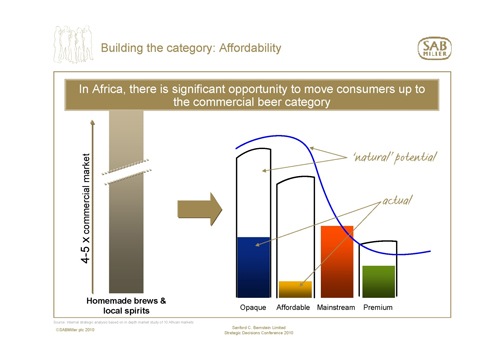Lawmakers target alcohol as public health problem
South Africa is crafting a new law to restrict alcohol advertising, raise the minimum drinking age to 21 from 18 and clamp down on drink driving, media reported in August 2012.The bill would also propose warning labels on alcohol containers, raising taxes and stricter licensing laws for alcohol outlets.
The bill will be discussed in South Africa’s cabinet in the next few weeks before its release for public comment.
Politicians from South Africa to Kenya are under pressure to do something about a problem that is adding to Africa’s burden of HIV, birth defects, road accidents and violent crime.
According to reports, South Africa has the world’s highest measured rate of Foetal Alcohol Syndrome, caused by mothers who are binge drinking during pregnancy. In some towns in the Cape Town region, ten percent of children have the condition, which causes learning difficulties and stunts growth.
Although Africa has large populations of Muslims and evangelical Christians who generally abstain from alcohol, the continent still shows the world’s highest proportion of binge drinkers. More than 25 percent of Africans are binge drinkers, says the World Health Organisation in a report.
Thanks to rising incomes and greater political stability, Africa has become a boom market for international brewers and distillers.
Analysts estimate beer volumes rose around 7 percent last year. Excluding the mature South African market, growth reached more than 10 percent.
Most African countries already have laws that prohibit underage drinking and drink driving, but these are poorly enforced and often completely ignored.
South Africa will not be alone in its attempt to curb binge drinking.
In Kenya authorities are also looking to raise the legal drinking age to 21 from 18, following on from a 2010 law that banned alcohol sales in grocery stores and in bars before 5 p.m.
Earlier this year, Zambia banned the manufacture and sale of spirits in cheap small plastic sachets.
In Nigeria, Africa’s most populous nation and number two beer market in terms of volume, alcohol regulation does exist but critics say it is loosely enforced.
For years, poor Africans were limited to home-brewed beer and moonshine, which were potentially lethal. Commercial alcohol is now widely available and brewers like SABMiller have started offering lower priced beer in order to win over drinkers from the home-brew market, which is said to be about four or five times the USD 11 billion commercial market.
Insiders say that higher alcohol taxes, which the South African bill is likely to impose, will have only one effect: push the poor back to potentially lethal home-brews.
Keywords
international beer market South Africa Kenya legislation
Authors
Ina Verstl
Source
BRAUWELT International 2012

